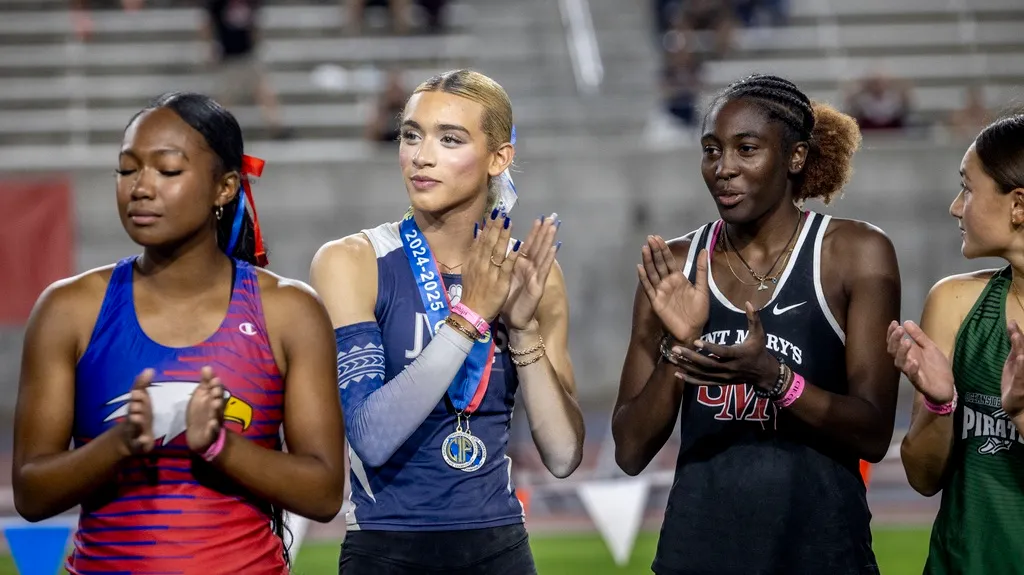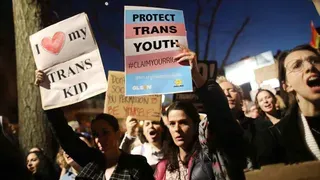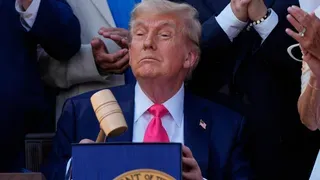June 9, 2008
All politics is local
Michael Wood READ TIME: 11 MIN.
If you thought the election excitement was over for Massachusetts after February's presidential primary, think again. While the John McCain-Barack Obama swing state smackdown will dominate prime time TV, there's no shortage of exciting state legislative races where political junkies can get their fix closer to home.
MassEquality will be working to pull off the hat trick of re-electing every pro-equality incumbent for the third consecutive election cycle, and some of the races promise to be nail-biters. For starters, one of MassEquality's most important allies, openly gay Rep. Carl Sciortino (D-Medford) will be forced to run for his seat as a sticker candidate after failing to file the required number of signatures with the Secretary of State's office. Another key ally, Sen. Dianne Wilkerson (D-Boston), faces a strong challenge from progressive Sonia Chang-Diaz, who came within six percentage points of beating her in 2006. MassEquality will also be working to protect three lawmakers whose last-minute vote switch on the marriage amendment last June was crucial to the amendment's defeat; at least one of those vote-switchers will be facing an anti-equality opponent. There is also the potential for the number of openly LGBT lawmakers to double this fall, with four out candidates running either for open seats or to unseat incumbents. The primary takes place Sept. 16, followed by the general on Nov. 4.
'Sticking with Sciortino'
Sciortino's campaign is poised to receive an influx of support from both LGBT advocates and progressive allies and he'll likely need all the help he can get to win a third term representing his Somerville-Medford district. As Bay Windows reported last week Sciortino's campaign collected enough signatures to qualify for the ballot, but while those signatures were certified by clerks in his Somerville-Medford district, several sheets of them went missing from his State House office before he could turn them in to the Secretary of State's office per state election rules (see "Pressing the Flesh," May 29). The two-term incumbent alleges they were stolen but his three legal appeals to have his name appear on the ballot have been denied.
His opponent, Somerville Alderman Bob Trane, did qualify for the ballot, meaning Sciortino will have to run a sticker campaign for his seat against a candidate whose name will appear on the ballot and who has name recognition and organization in the district. Sticker campaigns are often uphill battles as they require extra money for printing costs, in addition to superior organization and plenty of manpower to ensure that not only do the stickers get into the hands of voters, but that they are used properly in the voting booth.
MassEquality political director Matt McTighe, who said Sciortino and Wilkerson are "probably two of our highest priorities," said it is unclear how difficult it will be for Sciortino to hold onto his seat.
"We don't know yet. We haven't had a chance to do any comprehensive polling or analysis, but obviously it's a challenge, and MassEquality is going to be there," said McTighe.
Sciortino will also be getting a boost from progressive activists. Georgia Hollister Isman, director of Mass Alliance, a coalition of progressive organizations that includes MassEquality and the Massachusetts Gay and Lesbian Political Caucus, said the coalition has also endorsed Sciortino and would be campaigning hard for him.
"I think the Carl Sciortino race ought to be a priority for the statewide progressive community," said Isman.
While she expects his campaign to be difficult, she believes Sciortino has built up strong support in the district not only for his work on LGBT rights but for his work on a range of other issues.
"I also think he's done a great job on the bread-and-butter issues as a state rep, and I think the people of his district know that," said Isman.
Dan Cohen, a progressive political strategist who is working with Sciortino's campaign, said that while running a sticker campaign is far from ideal, Sciortino's race is still very winnable. He pointed to Sciortino's win in 2004, when he defeated longtime incumbent Vinnie Ciampa by conducting a hard-fought grassroots campaign and knocking on every door in the district three times. Ciampa mounted his own sticker campaign that fall during the general election to hold on to his seat and lost, which on first glance would seem to bode ill for Sciortino's own sticker campaign. But Cohen said there is a world of difference between running as a sticker candidate in a primary versus the general election. He pointed to state Rep. Tom Sannicandro's (D-Ashland) sticker victory over two other candidates whose names appeared on the ballot in the 2004 Democratic primary for the open 7th Middlesex District seat - a campaign executed with significant financial and human resources from MassEquality.
"For these low turnout primaries it becomes a little bit more difficult [to win as a sticker candidate], but it's a totally doable thing. It still just comes down to, you need to make the case about why you deserve to be re-elected. That's what we're going to be focused on," said Cohen.
A summer sequel in the 2nd Suffolk
Wilkerson is also a case study in the viability of an incumbent campaigning to hold onto her seat as a sticker candidate. Having failed to collect enough signatures to qualify for the ballot, she waged a sticker campaign run for her 2nd Suffolk District seat in the 2006 Democratic primary against three other sticker candidates. Her strongest challenger, Jamaica Plain activist Chang-Diaz, garnered 44 percent of the vote to Wilkerson's 50 percent. Wilkerson and Chang-Diaz, both strong progressives, lined up on most policy issues, and in large part the campaign became a referendum on Wilkerson's own checkered history, as her opponents questioned Wilkerson's ethics and highlighted a number of controversies that have surrounded Wilkerson throughout her career, including a conviction for failing to pay federal income taxes and a 2005 lawsuit by then-Attorney General Tom Reilly for campaign finance violations.
This time around both Wilkerson's and Chang-Diaz's names will appear on the Democratic primary ballot. Wilkerson has managed largely to avoid negative press coverage since the last election. But the incumbent said she is not resting on her laurels.
"We are gearing up for an aggressive and a ferocious campaign. There's no question. I take nothing and no one and no vote for granted. I will do again what I've always done, which is work hard and make the case on ... 15 years of fighting and delivering for a district [in a way] that is tangible. So I'm more than ready," said Wilkerson.
That includes making the case to the district's LGBT voters. In last month's Senate budget debates MassEquality credited her with successfully pushing for substantial funding increases for LGBT youth programs, elder programs, and domestic violence programs during a difficult budget year. Wilkerson said since entering the Senate in 1993 she has been the go-to member of that body for LGBT advocates - the first bill she filed in her legislative career was a domestic partnership bill - a role she shared with former Sen. Jarrett Barrios during his tenure in the Senate from 2002 to 2007.
"I've taken back the mantle that I carried for the ten years before [Barrios] was. So it's continuing to do what I've always done with tangible evidence to prove it," said Wilkerson.
McTighe said that while Wilkerson may be better positioned than she was in 2006, MassEquality still considers her "potentially vulnerable."
"Any time you have a race where one year it was really close for an incumbent you want to look at that person as being potentially vulnerable, and you want to do everything you can," said McTighe.
Chang-Diaz told Bay Windows that she believes she has a stronger chance to unseat Wilkerson than she did in 2006. In her first race she said she started with almost zero name recognition in the district, launched her campaign less than four months before the primary, and ran a campaign on a much smaller budget than Wilkerson's; despite those long odds she still won 44 percent of the vote as a write-in. This time around she said her campaign has more time, more money, and a network of supporters in the district, and she believes it will be easier to close the six percent gap.
"This time around it's a huge difference because we're starting where we left off in 2006. ... The clear number that we have, I have six percent to go. That was the number we needed in 2006," said Chang-Diaz.
And while she won't have the endorsement of MassEquality, she also brings gay street cred to the race, having worked as an aide to openly gay former state senator Cheryl Jacques and with MassEquality in the State House to preserve marriage equality. And just as MassEquality's support for Wilkerson two years ago outraged some members of the LGBT community, despite her lengthy record on LGBT issues (See "Abandoning ship," Sept. 28, 2006), it looks as though she won't have a lock on the LGBT vote this time around. In a recent e-mail circulated to members of the LGBT community, Carola Cadley, an out lesbian marketing executive, invited friends to a June 5 meet and greet for Chang-Diaz, who she is supporting, at a private home in Jamaica Plain. "Although Dianne Wilkerson has been a loyal supporter and friend to the community," Cadley wrote, "I have been uncomfortable with the way she has conducted herself over the past few years and I feel it's time for a change."
But Wilkerson said if she was able to survive a challenge through the scandals and the sticker campaign of 2006, she will be able to win this time around.
"I think there's probably a lesson there. If there was an environment and a time in which the right candidate and message could have been fatal for me, it probably was 2006, both the combination of the fury and the press but also the sticker campaign. ... [This campaign] will be about who has the experience, the intellect and the record of delivering and fighting for a constituency that has not always enjoyed the favor from everyone else. And I've done it," said Wilkerson.
Aiding the vote switchers
One of the other top priorities for MassEquality in this election is maintaining the organization's perfect record of helping all pro-equality lawmakers fend off any election challengers, but with the pro-equality contingent swelling to include more than three-quarters of the legislature that will surely be a more daunting task. Last June, when lawmakers defeated the constitutional amendment to ban same-sex marriage, Kris Mineau, president of the Massachusetts Family Institute (MFI), told the Boston Globe MFI would work to unseat four of the 11 lawmakers who switched their stance on the amendment at the last constitutional convention (ConCon) and voted against it: Reps. Angelo Puppolo (D-Wilbraham), Geraldo Alicea (D-Charleton), Richard Ross (R-Wrentham) and Paul Loscocco (R-Holliston), the latter of whom is not running for re-election. In October a New Jersey-based group called the National Organization for Marriage paid for a billboard in Puppolo's district comparing him to Benedict Arnold and Judas for his marriage vote.
Yet the threat of electoral reprisals from marriage equality opponents has largely failed to materialize. Of the ten vote-switchers running for reelection just three - Ross, Alicea, and state Rep. Paul Kujawski (D-Webster) - have challengers, and Ross's challenger, Thomas Roache, said he has no ties to anti-gay marriage forces. Richard Howell, a Wilbraham Republican who had vowed to challenge Puppolo in response to his ConCon vote, failed to qualify for the ballot. Brian McNiff, a spokesperson for Secretary of State William Galvin, said Howell filed the required signatures to qualify, but he did not file a required receipt showing he had filed an ethics report with the state Ethics Commission; McNiff said he was unsure whether that or some other factor kept Howell off the ballot.
McTighe said it is too soon to tell how formidable the three vote-switchers' challengers will be, but he said regardless of their challengers' stance on marriage MassEquality is committed to ensuring that they get reelected.
"It has yet to be seen whether any of [their opponents] are going to be campaigning on this issue and using it in the campaign and whether our opponents are going to be backing any of them financially ... We're prepared to see them play some role, we're prepared to match whatever they do and working harder," said McTighe.
Ross said that he has worked to mend fences and explain his vote to his constituents, but for at least some of those constituents his vote against the marriage amendment is still a sore spot. He recently sent a mailing to all of the Republicans in his district, but a few came back to him with angry messages.
"They said they could not support me because of my vote on marriage and said some other derogatory things as well," said Ross.
He said he does not know how his vote will impact the race, but he does not intend to run from it.
"I am going to have a race. I am still looking for all the support I possibly can. And the important thing is obviously the vote I took I still stand by 100 percent, and I know I did the right thing for the constituents in my district," said Ross.
Roache said his decision to challenge Ross was unrelated to the marriage amendment vote. A 28-year-old Medfield independent candidate, he said one of his main goals in the campaign is to remain independent from special interests on any side of polarizing social issues. He said he supports full legal benefits for same-sex couples and has no problem with those couples using the term marriage, but as a representative of his district he would instead support civil unions because he believes many people in his district oppose granting the term marriage to same-sex couples.
"At the end of the day they'll say, of course people deserve equal rights. ... But for whatever reason there is a holdout on behalf of our community who I will have to represent and will have to work with on who uses the word marriage and who owns it," said Roache.
The marriage amendment will likely be a factor in Alicea's race. His opponent, Republican Ronald Chernisky, did not discuss the marriage amendment during a recent interview with the Worcester Telegram and Gazette, but last December he received a contribution from MFI's sister PAC, the Massachusetts Independent PAC for Working Families, as well as from several longtime MFI board members. Given the apparent MFI stamp of approval on his candidacy, it is a good bet he'll go after Alicea for his vote switch. Kujawski's two opponents, Kevin Kuros, a Republican selectman from Uxbridge, and Richard Preston, a Democratic former selectman from Douglas, did not return calls to discuss their stance on marriage.
Trouble for anti-equality pols?
Beyond defending incumbents MassEquality will also be working to unseat a few anti-equality incumbents. Among the challengers in MassEquality's first round of endorsements are Sara Orozco, an openly gay Needham Democrat, who is challenging anti-gay Sen. Scott Brown (R-Wrentham) (see 'Gay Cadidates coming out of the woodwork," p.16 ), and Patrick McCabe, a Medford Democrat who is trying to unseat Rep. Paul Donato (D-Medford), who also supported the marriage amendment. Cohen said both Orozco and McCabe are running strong campaigns.
"We all know how difficult it is to defeat an incumbent. What you want to have at this stage is a compelling candidate doing the right things, raising money and making a strong case, and both Patrick McCabe and Sara Orozco are doing just that in their districts," said Cohen.
MassEquality's primary goal this election cycle is to re-elect every pro-equality incumbent, but that may change next time around. Since the defeat of the marriage amendment MassEquality has expanded its mission to include a wider LGBT rights agenda including youth, transgender, elder, and domestic violence issues. McTighe said after 2008 MassEquality might broaden its endorsement criteria to reflect that mission, meaning a strongly pro-LGBT challenger could have an edge over a more tepid marriage equality supporter.
"We feel like it would be unfair to raise the bar [this year] and say, thank you for your vote last year, but where do you stand on the transgender bill or MassHealth Equality. ... After November it's quite possible we will reassess and broaden our criteria. No matter what happens I think we always will give preferential treatment to incumbents," said McTighe.
Michael Wood is a contributor and Editorial Assistant for EDGE Publications.







